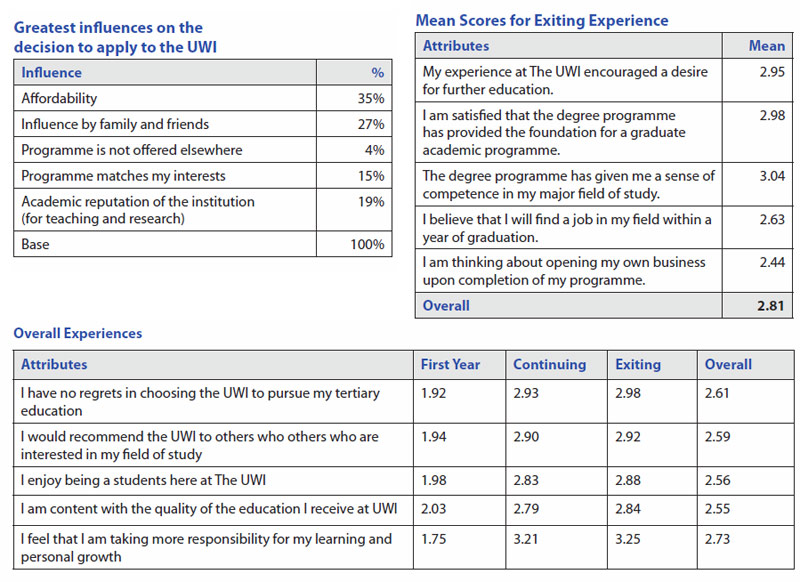|
February 2015

Issue Home >>
|

The Graduate Tracer Survey is a project carried out by the Campus Office of Planning & Institutional Research (COPIR) as part of its institutional research agenda. The information from it serves to guide the management team of The UWI in how it shapes systems, policies and processes.
The Survey investigates the post-university experience of first degree graduates of the St. Augustine campus. In particular it seeks to assess their experiences in terms of employability and the workplace, their perceptions about their UWI programme and the on-the-job impact of skills acquired during their undergraduate period of study, as well as their inclination to pursue further studies at The UWI.
The survey is an ongoing project that will continue the work of previous surveys and will also be a tool for evaluating the extent to which the Campus is able to meet the goals set out by the UWI Strategic plan (2012-2017), in terms of enhancing the student experience. The information from the graduates provides valuable feedback on emerging trends in the job market and insight into how the undergraduate education at UWI is preparing them for the world of work. Where challenges are identified, there is the opportunity to address them through further strengthening and development in the curriculum, and improvement to the student support systems and processes.
The Graduate Tracer Survey is delivered to first degree graduates of all faculties and is conducted one year after graduation ideally. Earlier surveys have been led in 2010 and 2012 via an online survey application.
The following highlights key findings based on the responses and feedback obtained from the 2010 and 2012 surveys:
- Time taken to find employment has been positive where the trends indicate that graduates have taken an average of eight months to find a job.
- Employability in respect of the 2010 Survey suggested that 83% of the graduates were employed after two years, and at the time of graduation, approximately 56% were employed on a full-time basis.
- In both 2010 and 2012, between 70 and 80 % of first degree graduates gained employment at the professional, technical and associated professional level, the top economic activities being education, engineering, health and business and administration professionals.
- Approximately 50% of graduates gain employment in the public/government sector, primarily in education, health and social services.
- In terms of the sectors of employment, close to 40% of respondents reported being employed in the private sector, the main areas of activities being in the energy based and financial and insurance services industries, as growing areas for expanding economic activity.
- On average, a little over 2% of respondents were self-employed. These respondents worked in the area of health and social services.
- In both surveys, respondents reported moderate satisfaction with the applicability of their degree programme in the workplace.
- Two-thirds of graduates indicated their desire to pursue postgraduate studies and that The UWI was their first choice.
- Overall, respondents felt that the UWI experience had a moderate impact on their personal and professional development with regard to critical thinking, communication skills and an appreciation for social, cultural and environmental responsibilities.

|





